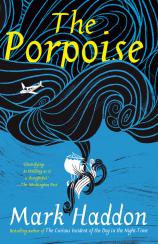The Porpoise
Review
The Porpoise
If you’re in search of an adventure story whose emotional heart is every bit as capacious and captivating as its tales of palace intrigue, sexual misconduct, plague, shipwrecks, kidnapping and attempted murder, look no further than Mark Haddon’s astonishing new novel, THE PORPOISE.
Haddon brilliantly reimagines the ancient legend of Appolinus of Tyre, as retold by Shakespeare in his play, “Pericles, Prince of Tyre,” a work that Cynthia Zarin, in a 2016 New Yorker piece, described as “perhaps the strangest play in Shakespeare’s canon.” It’s just the kind of bold venture one would expect from the author of works that include THE CURIOUS INCIDENT OF THE DOG IN THE NIGHT-TIME, a sui generis mystery narrated in the voice of an autistic 15-year-old boy, and a pleasingly diverse short story collection, THE PIER FALLS.
For all its grounding in obscure myth, THE PORPOISE begins, literally, on contemporary turf. A small plane carrying Swedish actress Maja Söderberg, about to give birth to her first child, crashes in fog in the French countryside. Maya dies, but her daughter miraculously survives, to be named, appropriately, Angelica.
Angelica’s father, Philippe, is a wealthy businessman, the member of a family that has “always prided itself as part of a global aristocracy,” someone who owns five homes scattered around the world, from Berlin to Sri Lanka. As Angelica grows, Philippe’s protectiveness morphs into perversion, his wrongdoing concealed by his compliant and slightly creepy household staff.
"Mark Haddon has produced a transporting story that’s deeply thrilling and powerfully emotional, one that’s both a pulsating entertainment and a true thing of beauty."
And when a handsome young man named Darius, the son of Philippe’s late art dealer, pays a visit to his English estate, he discovers something is dreadfully amiss in the relationship between father and daughter. Angelica is a beautiful young woman whose father ruthlessly has walled her off from the outside world, but she’s acquired a passion for reading, notably “stories that set deep truths ringing like bells, that take the raw materials of sex and cruelty, of fate and chance, and render them safe by trapping them in beautiful words.”
And that’s precisely the kind of story Haddon delivers when the novel kicks into high gear about a quarter of the way along. Wounded by a desperate Philippe as he flees the mansion possessed with the family’s dark secret, Darius is spirited by friends onto a yacht called the Porpoise. As it begins its journey, the vessel magically morphs into one whose “sails are huge, and square, and there are way too many of them,” equipped with “actual cannons --- black iron shafts, wooden bases, solid wooden wheels,” and the story of Pericles, a man who “longs for action,” one who realizes that “glory and gratitude…“are more pleasurable in the earning than the receipt,” takes to the waves.
Evading a man named Kallios, inexplicably dispatched to murder him, Pericles eventually makes his way to Tarsus, after the city is ravaged by plague, and helps to revive the devastated community. But when Kallios’ pursuit drives him back to sea, where he survives a spectacular shipwreck, Pericles lands in a kingdom whose rulers deem him a suitable match for their daughter, Chloë, once they discover he’s no common gladiator, but instead a prince.
That union produces a daughter, Marina, born at sea in a terrifying scene reminiscent of the opening plane crash. The three are scattered, and the balance of the novel follows the characters, with impressive efficiency over nearly two decades, as each must reckon with loss and grief. Into their stories, Haddon periodically inserts frightening glimpses of Angelica’s increasing desperation, as she comprehends the enormity of her father’s evil and crafts a plan to confront it.
As if to lighten the somber tone of the novel, Haddon even tosses in a handful of hilarious scenes in which Shakespeare’s spirit shepherds George Wilkins, “victualler, pimp, minor criminal, abuser of women,” the man generally believed to be the co-author of “Pericles, Prince of Tyre,” into the afterlife (the Thames a stand-in for the River Styx) after his sudden death. It’s a mini-journey through the world of early-17th-century London that brings the teeming city to life in a few well-crafted pages.
Haddon’s writing triggers all the senses, in sumptuous scenes of exotic cities and spectacular countryside, in his perceptive evocations of his characters' interior lives and in sword-sharp metaphors, like the stars that resemble “powdered glass on velvet,” or the character whose “eyes are nails hammered into the wall of his face.” There’s a constant tension between the desire to linger over Haddon’s vividly evoked settings and the urge to turn the page as in any compelling adventure story simply to find out what happens next to these engaging characters.
In the hands of a lesser writer, THE PORPOISE could have turned into nothing more than a gimmick-filled attempt to pump life into a hoary piece of second-rate Shakespearean drama. Instead, Mark Haddon has produced a transporting story that’s deeply thrilling and powerfully emotional, one that’s both a pulsating entertainment and a true thing of beauty.
Reviewed by Harvey Freedenberg on June 21, 2019
The Porpoise
- Publication Date: May 12, 2020
- Genres: Fiction
- Paperback: 320 pages
- Publisher: Vintage
- ISBN-10: 0525564403
- ISBN-13: 9780525564409




